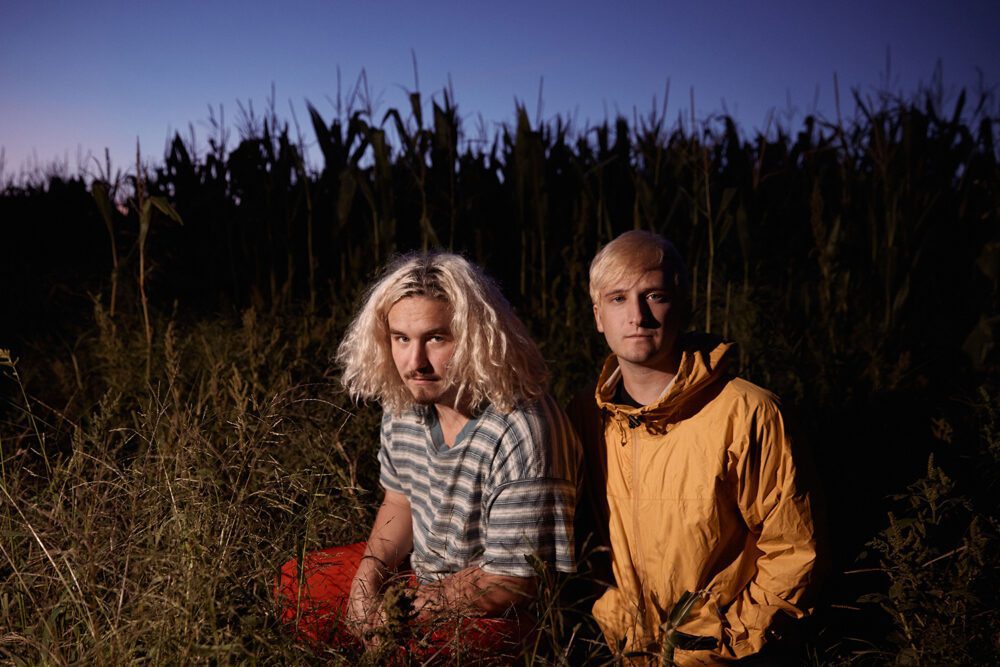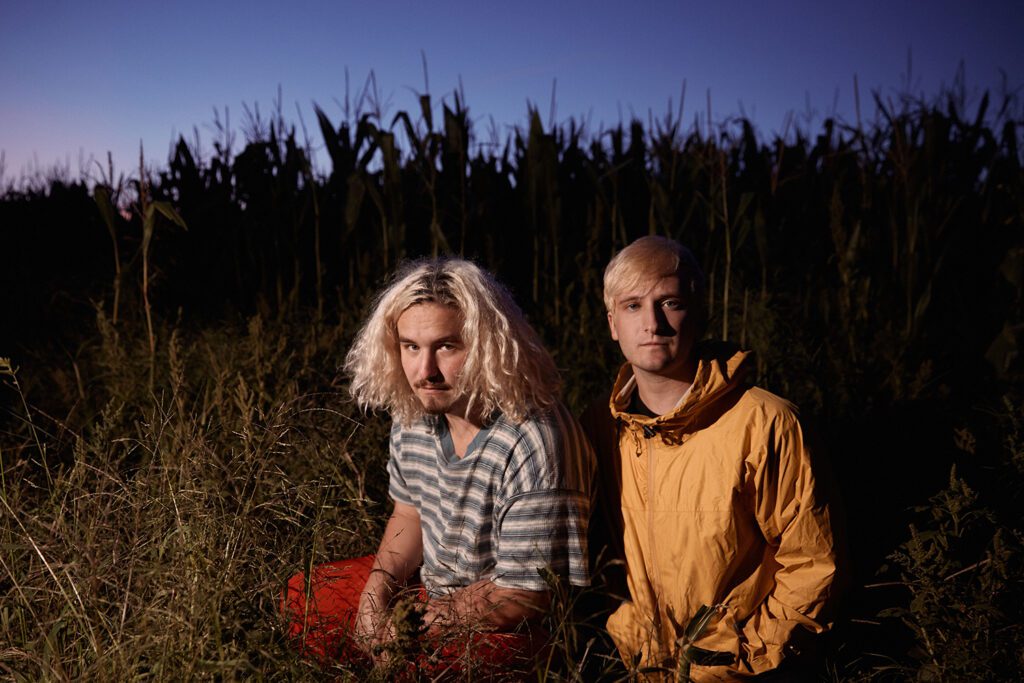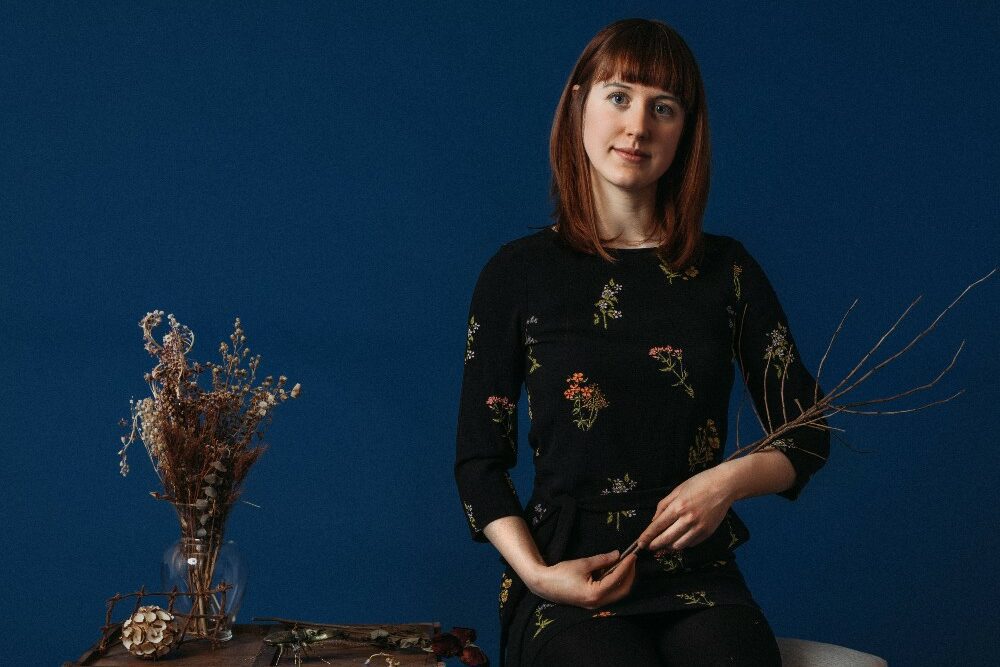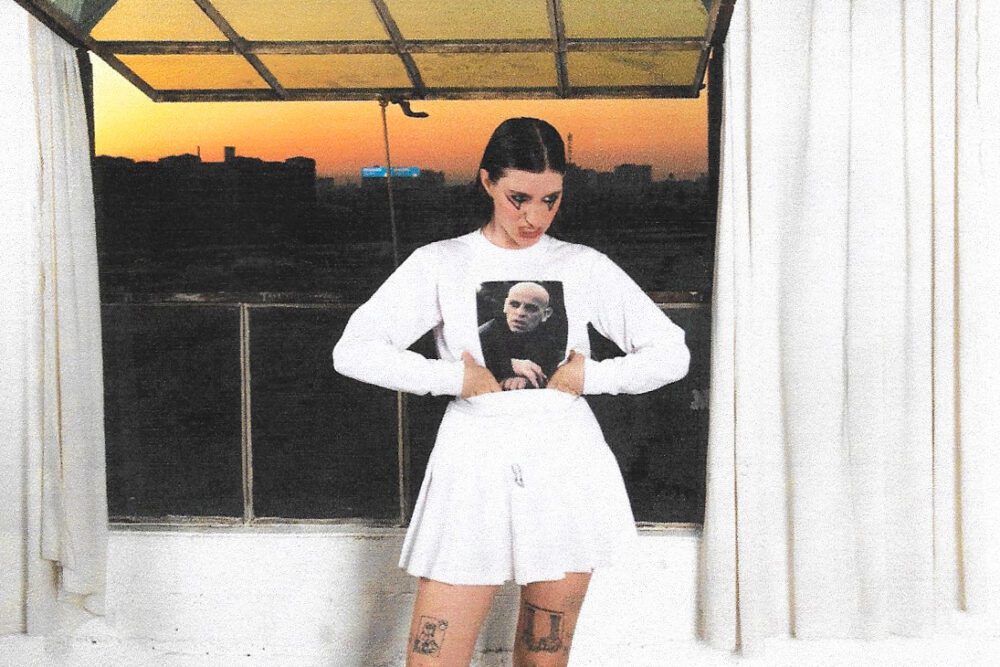

TOLEDO didn’t plan on recording a new EP. “It just happened,” admits band member Jordan Dunn-Pilz. “It kept us busy, and we were able to have fun together. I’m thankful for this opportunity to come back into our own.” He is speaking about their recently-released project Jockeys of Love, on which he and collaborator Daniel Alvarez tackle themes of anxiety, depression, and alcoholism.
“We would have written music no matter what. The reason the songs turned out the way they did is I got hit with the breakup and pandemic double-whammy,” Dunn-Pilz tells Audiofemme. Unsure of their future, the NYC-based duo returned to their shared hometown, the seaport community of Newburyport, Massachusetts, to re-center and re-prioritize their lives. That’s when a batch of new music poured out.
“Compared with the social life in New York, I had a lot of alone time to think about things,” Dunn-Pilz continues. He began sifting through his life, picking apart existential queries, like why it was so hard to be “present in the moment” (which turned into “FOMO,” an EP precursor). “We had written a bunch of other songs with similar themes,” he says, “and that served as the foundation for the EP.”
Opener “It’s Alive!” is among their boldest songs yet, thematically calling to such gothic setpieces as Frankenstein and The Nightmare Before Christmas, and gives them room to wallow in the pain as a way to let it slide off their skin. “I’ll never be what you want me to be,” they sing. Delicate guitar mists around them, as spooky percussion peeks in and out of the arrangement, directly mirroring the onscreen imagery of someone as merely “a collection of parts and scraps that someone else put together.”
Even the song itself was “very much stitched” in place, Dunn-Pilz explains. “Everything you hear in the foundation of drums, bass, and acoustic guitar existed already; Daniel had made a demo out of that.” Alvarez constructed the backbone like a Big Thief song, and Dunn-Pilz added the topline and electric guitar, much later cutting and pasting various drum sections “to change the structure” completely.
Such intricacies are strung together across all six songs, co-produced with Jorge Elbrecht, known for working with Ariel Pink and Wild Nothing. “Sunday Funday” testifies to the power of “finding empathy” in the world by examining alcoholism from the point of view of “being there for someone who’s dealing with something you’ve never experienced.” “Challenger” teeters between cosmic shimmer and rootsy banger, as TOLEDO envisions a not-so-distant dystopian future in which art is actually an act of rebellion against the state.
Dunn-Pilz is in a unique position; he’s a theatre geek at heart, having studied acting at Ithaca College in upstate New York, and has seen arts programs ravaged by defunding first hand. Pack on the pandemic, and you’ve got “a wild year” during which he’s questioned the very validity of making art.
“I was feeling very down on myself about being a musician in comparison to all the much more important things happening on a global scale,” he reflects. “It’s a dark path to go down because maybe I don’t wanna know what’s on the other side. I was having a lot of conversations with people.”
In the pandemic’s early days, Dunn-Pilz and Alvarez were both collecting unemployment while witnessing their “friends working their asses off from home,” he continues. “They would say things like, ‘Oh, all you guys do is sit around, get government money, and make music all day.’”
That unfeeling, perhaps even cruel, way of thinking is exactly what perpetuates this peculiar idea that art has no value. It pierced Dunn-Pilz to the core. “Imagine a world where people got paid to do what they love and what they’re good at doing. That lit a fire under me,” he admits. He soon shed any and all doubts and began writing songs as a “‘fuck you’ to everyone that tells me that what I do is being wasted,” he adds. “Everyone wants to consume it, but no one wants to pay for it.”
Fire spills off his tongue as he speaks ─ and those flames grow to a thunderous roar on songs like “Dog Has Its Day” and “Needer,” the closing track peeling back layers of his pandemic-wrought anxieties. “There’s no way this song would exist if the pandemic hadn’t happened ─ not that it was worth it for this one stupid song,” he says, only half-joking.
Over skin-pricking guitar, and a tortured ambiance that seems to puddle beneath him, he invites the listener right into his clouded headspace. “I worry about my apartment in New York/And picture it molding/My backyard’s a blessing, but I don’t need it,” he laments.
Jockeys of Love serves as the follow-up to 2019’s Hotstuff, feeling profoundly more accomplished, raw, and musically adept. For two musicians who’ve known each other since childhood, it’s the kind of statement piece that lays the foundation for a long career ─ as hyperbolic as that is, their work here is exemplary.
Alvarez and Dunn-Pilz met through a mutual friend in middle school. Straight away, they felt like “kindred spirits,” as Dunn-Pilz remembers it. “Pretty much as soon as we met, we were inseparable,” he says. He was already playing guitar, while Alvarez demonstrated a knack for piano. They set about busking along the market square in downtown Newburyport; the community celebrated and fostered the arts, so they never worried about getting booed or having to dodge insults.
Several years later, after some time apart during their college days, they got an apartment together in Washington Heights. Thinking the pandemic might be course-correcting last summer, they returned to the city life in August ─ and have, of course, realized that was a bit premature. Left to their creative devices, they built a home studio and have become newly-minted vinyl collectors, which Dunn-Pilz says has been a great way “to reconnect with music.” Feeling a disconnect with streaming playlists, he begins every day “by putting on a record and listening to the whole thing. I now have time reserved for just listening to music.”
Among his collection? Hovvdy’s 2018 Cranberry, Stephen Steinbrink’s Utopia Teased, the soundtrack to “Once More With Feeling” (the cult-hit musical episode of Buffy the Vampire Slayer) and a Greatest Country Hits of the ‘70s compilation. He’s spun the latter so frequently that the duo have even been writing some country songs lately, finding great inspiration from Dolly Parton and Ronnie Milsap.
Jockeys of Love hinges on their personal emotional excavations, subverting the long-standing belief that men should never show emotions. Through his theatre and musical work, Dunn-Pilz has learned how to “get emotions out in the open and face them,” he says. “I’m sure I would be much worse off if I wasn’t as in touch with my emotions. I’m proud of being comfortable with emotions, in general.”
Music has been a catalyst for catharsis, whether he’s creating it with TOLEDO or simply listening. “When I have something that’s troubling me, my first instinct is to get a guitar out and speak into the open and see what comes out. I’ll usually learn something about myself in the process,” he says. “Listening to music can give people a similar experience. There might be some macho Chad listening to Phoebe Bridgers, and he hears her touch on something he can relate to.” That rings true for Jockeys of Love, too – and in times like these, we can all use a little empathy.




